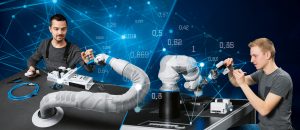
Researchers from Germany and Canada work on new AI methods for picking robots
Canadian Plastics
Research & Development Robots & AutomationThe researchers are investigating how to use training data from multiple stations, from multiple plants, or even companies without requiring participants to hand over sensitive company data.

Festo, along with researchers from Germany and Canada, are working on new AI methods for picking robots. Photo Credit: Festo
Robotic picking is an important application in production, warehousing, and shipping.
Which is why pneumatic and electrical automation equipment maker Festo is teaming up with researchers from the Karlsruhe Institute of Technology (KIT) in Germany and two Canadian partners – the University of Waterloo and software company DarwinAI of Waterloo, Ont. – in the Federated Learning for Robot Picking (FLAIROP) project, which seeks to enhance picking robots through the use of distributed Artificial Intelligence (AI) methods.
To do this, they’re investigating how to use training data from multiple stations, from multiple plants, or even companies without requiring participants to hand over sensitive company data. The Canadian project partners focus on object recognition through Deep Learning, Explainable AI, and optimization, while the German partners contribute their expertise in robotics, autonomous grasping through Deep Learning, and data security.
“We are investigating how the most versatile training data possible from multiple locations can be used to develop more robust and efficient solutions using artificial intelligence algorithms than with data from just one robot,” said Jonathan Auberle from the Institute of Material Handling and Logistics (IFL) at KIT. In the process, items are further processed by autonomous robots at several picking stations by means of gripping and transferring. At the various stations, the robots are trained with very different articles. At the end, they should be able to grasp articles from other stations that they have not yet learned about. “Through the approach of federated learning, we balance data diversity and data security in an industrial environment,” Auberle said.
Until now, federated learning has been used predominantly in the medical sector for image analysis, where the protection of patient data is a particularly high priority. Consequently, there is no exchange of training data such as images or grasp points for training the artificial neural network. Only pieces of stored knowledge – the local weights of the neural network that tell how strongly one neuron is connected to another – are transferred to a central server. There, the weights from all stations are collected and optimized using various criteria. Then the improved version is played back to the local stations and the process repeats.
The goal of the FLAIROP project is to develop new, more powerful algorithms for the robust use of artificial intelligence for industry and Logistics 4.0 while complying with data protection guidelines – which means that sensitive data and company secrets aren’t revealed and shared. “This brings two major benefits: we protect our customers’ data and we gain speed because the robots can take over many tasks more quickly,” said Jan Seyler, head of advanced development, analytics and control at Festo SE & Co. KG. “In this way, the collaborative robots can, for example, support production workers with repetitive, heavy, and tiring tasks.”
During the project, a total of four autonomous picking stations will be set up for training the robots: Two at the KIT Institute for Material Handling and Logistics (IFL) and two at the Festo SE company based in Esslingen am Neckar, Germany.
“The University of Waterloo is ecstatic to be working with Karlsruhe Institute of Technology and a global industrial automation leader like Festo to bring the next generation of trustworthy artificial intelligence to manufacturing,” said Dr. Alexander Wong, co-director of the Vision and Image Processing Research Group, University of Waterloo, and chief scientist at DarwinAI. “By harnessing DarwinAI’s Explainable AI (XAI) and Federated Learning, we can enable AI solutions to help support factory workers in their daily production tasks to maximize efficiency, productivity, and safety.”